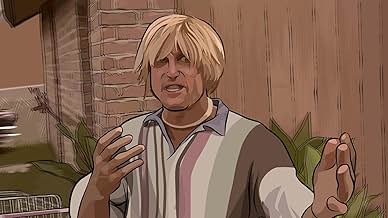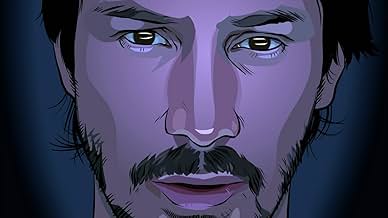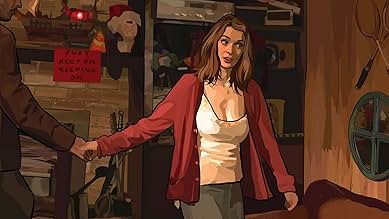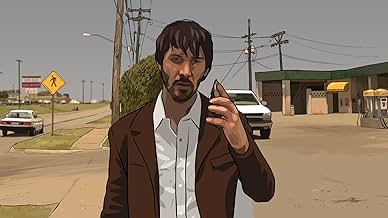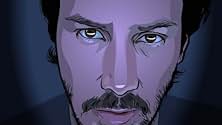Ein Undercover-Polizist gerät in nicht allzu ferner Zukunft in eine gefährliche neue Droge und verliert dadurch seine eigene Identität.Ein Undercover-Polizist gerät in nicht allzu ferner Zukunft in eine gefährliche neue Droge und verliert dadurch seine eigene Identität.Ein Undercover-Polizist gerät in nicht allzu ferner Zukunft in eine gefährliche neue Droge und verliert dadurch seine eigene Identität.
- Regie
- Drehbuch
- Hauptbesetzung
- Auszeichnungen
- 4 Gewinne & 21 Nominierungen insgesamt
- Additional Fred Scramble Suit Voice
- (Synchronisation)
- Voice from Headquarters
- (Synchronisation)
- Waitress
- (as Natasha Valdez)
- Additional Hank Scramble Suit Voice
- (Synchronisation)
- Freck Suicide Narrator
- (Synchronisation)
Empfohlene Bewertungen
Linklater and Dick are a perfect match.
The story is about a deep-cover narcotics officer (Reeves) who is in danger of becoming one of his own targets, since he has become addicted to a very popular and addictive hallucinogen - Substance D (AKA "Death") The cast is all very good, and extremely well suited for their characters. But here again, we are seeing Linklater's interpretation of the novel. He saw the comedic potential for the Barris character and played it up by giving the role to Downey and presenting Harrelson as a combination of loyal side-kick and straight-man to Downey's sometimes overpowering Barris.
What the story is really about is the culture of recreational drug use and addiction. Its portrayal of this is on target, and though the subject is treated with some sympathy, the contradictory messages, denials, and complex rationalizations permeating that culture also come through powerfully. In this manner, the film nails the book spot-on.
Reeves is perfectly cast as Arctur. His subtle and somewhat detached style is exactly what was needed for this complex and sympathetic character. And although some have stated that he was "blown off the screen by Downey and Harrelson" I couldn't agree less. Downey is louder and more domineering, yes, but Arctur is not a loud, ultra-dynamic, paranoid, and could not be played in a way which could compete with Downey's character.
Although I believe Winona Rider to be very talented, I had my doubts about her in the role of Donna - one of my favorite characters in Dick's novel. However, once again, Winona exceeded my expectations. I have never seen a bad performance out of her.
This is great casting, period.
While these are not criticisms, I feel obligated to make a couple of comments comparing the book and the film. First, the film is not really as dark and disturbing as the book. I can not explain why in this review - you will have to see it to understand why I say this. Second, I was very slightly disappointed by the reduced role of Donna in this film. Third - though some have commented that the film was hard to follow and that they felt they could only really get it if they read the book - I can only say that this is probably intentional. Yes, many of Linklater's films are non-linear and can be hard to follow for those who expect to have things explained to them. Linklater is, if nothing else, an artist and doesn't seem very interested in linearity or explanation. And the original work by Dick is no less ambiguous. In fact it is, in my opinion, more ambiguous.
This film does a great job of bringing to the screen one of the most intelligent and emotional works of science fiction ever written. My thanks to all involved.
In this prescient tale set in the "near future," Keanu Reeves plays the undercover cop, Agent Fred, who, under the pseudonym Bob Arctor, is sent to live in a home with several known drug addicts: Barris, played by Robert Downey Jr. and Luckman, played by Woody Harrelson. When Fred begins taking the newly fabricated drug known as "Substance D," which causes the two hemispheres of the brain to disconnect and go to war with one another, Fred/Arctor becomes essentially two distinctly separate persons, so that, in his capacity as an undercover agent, he is actually spying on himself without realizing it. Winona Ryder appears as Donna, the beautiful but sexually frigid coke addict who becomes Arctor's girlfriend.
"A Scanner Darkly" is an easy film for a viewer to get lost in, so it pays to know a little something about the story before heading into it. As a screenwriter, Linklater captures the woozy insubstantiality of the drug experience well enough but often at the expense of narrative consistency and coherence, especially for the uninitiated. I'm afraid lots of people may become frustrated and confused near the beginning and simply tune out. That would be a real shame because the movie turns into a darkly fascinating rumination on the effect drug use has on the mind, while at the same time raising the ethical issue of just how far the government should go in "sacrificing" innocent victims to achieve a desired, perhaps even laudable, end. At times the movie may seem to be playing both sides of the drug-war fence, yet the sophistication and complexity of Dick's vision keeps it from becoming either an anti-government screed or an anti-drug diatribe.
Some of the dialogue comes off as corny and over earnest, but much of it is incisive and darkly humorous, with Barris and Larkman, in particular, hitting delicious comic heights in their paranoid/delusional ravings and interchanges.
For those who haven't read the book, it's important to know what you're getting into. PK Dick wrote this novel as a way of telling the story of how he and his friends in the early '70s damaged and destroyed themselves with drugs. He tells this story within the framework of a surreal science fiction thriller, but many of the scenes are straight from his own experiences with the unpleasant consequences of people using drugs and disintegrating mentally.
This film does an amazing job of capturing the feel and tone of the book as well as the paranoia, perceptual distortions, and chaos of hallucinogenic overindulgence. Add to that a story that only gradually emerges from the madness, but by the end brings in a lot of heavy ideas such as the existence of free will, whether ends justify means, etc. There is a sense of consequence to what happens in the film, a sense of despair at what has been lost. So this story of drug-addled losers becomes the story of the human struggle for identity and meaning.
I have a couple of minor quibbles regarding scenes from the book that only partially made the cut (no explanation for the significance of "If I'd known it was harmless I would have killed it myself, no little kid to explain how 6 and 3 gears means 18 speeds). Still, most adaptations of PK Dick stories take a few basic ideas and try to shape them into more conventional films that fit into established genres. Even when it works, such as with Blade Runner or Total Recall, it's not really PK Dick. Not so this film. This is PK in all his dark and perverse and deeply thoughtful glory.
Wusstest du schon
- WissenswertesRobert Downey, Jr. wrote most of his lines down on post-it notes and scattered them around the set so he could read off them while filming a scene. The rotoscoping team simply animated over the notes to remove them from the film during post-production.
- PatzerWhile showing the monitoring equipment, Hank tells Fred that he could be anyone from Arctor's circle of friends, including Barris. This made sense in the book, however, by this time in the movie Hank has already seen Fred alongside Barris, so he could not possibly think they are the same person.
- Zitate
Fred: [voiceover] What does a scanner see? Into the head? Down into the heart? Does it see into me? Into us? Clearly or darkly? I hope it sees clearly because I can't any longer see into myself. I see only murk. I hope for everyone's sake the scanners do better, because if the scanner sees only darkly the way I do, then I'm cursed and cursed again.
- Crazy CreditsThe "Phil" mentioned in the "in memoriam" list as having permanent pancreatic damage is Philip K. Dick himself.
- SoundtracksFog
Written by Thom Yorke (as Thomas Yorke), Phil Selway (as Philip Selway), Jonny Greenwood (as Jonathan Greenwood),
Colin Greenwood and Ed O'Brien (as Edward O'Brien)
Performed by Radiohead
Courtesy of Capitol Records
Under licence from EMI Film & Television Music
Top-Auswahl
Details
- Erscheinungsdatum
- Herkunftsland
- Offizieller Standort
- Sprache
- Auch bekannt als
- Una mirada a la oscuridad
- Drehorte
- Produktionsfirmen
- Weitere beteiligte Unternehmen bei IMDbPro anzeigen
Box Office
- Budget
- 8.700.000 $ (geschätzt)
- Bruttoertrag in den USA und Kanada
- 5.501.616 $
- Eröffnungswochenende in den USA und in Kanada
- 391.672 $
- 9. Juli 2006
- Weltweiter Bruttoertrag
- 7.660.857 $
- Laufzeit1 Stunde 40 Minuten
- Farbe
- Sound-Mix
- Seitenverhältnis
- 1.85 : 1
Zu dieser Seite beitragen




